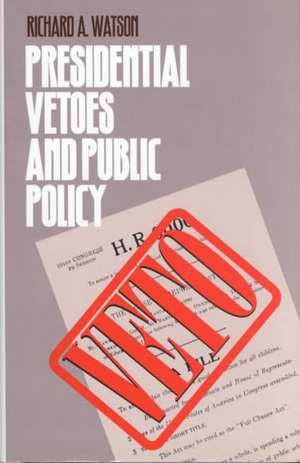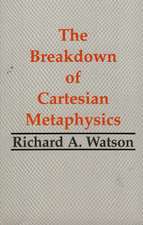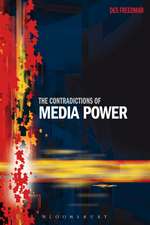Presidential Vetoes & Pub Policy: Studies in Government & Public Policy
Autor Richard A. Watsonen Limba Engleză Hardback – 31 iul 1993
Din seria Studies in Government & Public Policy
-
 Preț: 240.17 lei
Preț: 240.17 lei -
 Preț: 246.96 lei
Preț: 246.96 lei -
 Preț: 198.66 lei
Preț: 198.66 lei -
 Preț: 240.72 lei
Preț: 240.72 lei -
 Preț: 199.42 lei
Preț: 199.42 lei -
 Preț: 244.21 lei
Preț: 244.21 lei -
 Preț: 195.94 lei
Preț: 195.94 lei -
 Preț: 406.44 lei
Preț: 406.44 lei -
 Preț: 222.92 lei
Preț: 222.92 lei -
 Preț: 240.93 lei
Preț: 240.93 lei -
 Preț: 222.48 lei
Preț: 222.48 lei -
 Preț: 197.46 lei
Preț: 197.46 lei -
 Preț: 200.57 lei
Preț: 200.57 lei -
 Preț: 202.30 lei
Preț: 202.30 lei -
 Preț: 222.48 lei
Preț: 222.48 lei -
 Preț: 198.27 lei
Preț: 198.27 lei -
 Preț: 201.72 lei
Preț: 201.72 lei -
 Preț: 203.45 lei
Preț: 203.45 lei -
 Preț: 200.18 lei
Preț: 200.18 lei -
 Preț: 203.66 lei
Preț: 203.66 lei -
 Preț: 197.28 lei
Preț: 197.28 lei -
 Preț: 209.43 lei
Preț: 209.43 lei -
 Preț: 239.20 lei
Preț: 239.20 lei -
 Preț: 436.04 lei
Preț: 436.04 lei -
 Preț: 199.96 lei
Preț: 199.96 lei -
 Preț: 197.67 lei
Preț: 197.67 lei -
 Preț: 240.93 lei
Preț: 240.93 lei -
 Preț: 246.71 lei
Preț: 246.71 lei -
 Preț: 199.58 lei
Preț: 199.58 lei -
 Preț: 199.96 lei
Preț: 199.96 lei -
 Preț: 396.82 lei
Preț: 396.82 lei -
 Preț: 267.11 lei
Preț: 267.11 lei -
 Preț: 222.71 lei
Preț: 222.71 lei -
 Preț: 243.06 lei
Preț: 243.06 lei -
 Preț: 223.47 lei
Preț: 223.47 lei -
 Preț: 200.95 lei
Preț: 200.95 lei -
 Preț: 240.72 lei
Preț: 240.72 lei -
 Preț: 197.89 lei
Preț: 197.89 lei -
 Preț: 224.44 lei
Preț: 224.44 lei -
 Preț: 197.89 lei
Preț: 197.89 lei -
 Preț: 238.61 lei
Preț: 238.61 lei -
 Preț: 215.32 lei
Preț: 215.32 lei -
 Preț: 223.08 lei
Preț: 223.08 lei - 5%
 Preț: 229.41 lei
Preț: 229.41 lei -
 Preț: 398.77 lei
Preț: 398.77 lei -
 Preț: 196.53 lei
Preț: 196.53 lei -
 Preț: 199.20 lei
Preț: 199.20 lei -
 Preț: 201.33 lei
Preț: 201.33 lei
Preț: 393.93 lei
Nou
Puncte Express: 591
Preț estimativ în valută:
75.38€ • 80.61$ • 62.85£
75.38€ • 80.61$ • 62.85£
Carte tipărită la comandă
Livrare economică 17 aprilie-01 mai
Preluare comenzi: 021 569.72.76
Specificații
ISBN-13: 9780700606207
ISBN-10: 0700606203
Pagini: 232
Dimensiuni: 160 x 231 x 24 mm
Greutate: 0.47 kg
Ediția:New.
Editura: REGENTS PRESS OF KANSAS
Seria Studies in Government & Public Policy
ISBN-10: 0700606203
Pagini: 232
Dimensiuni: 160 x 231 x 24 mm
Greutate: 0.47 kg
Ediția:New.
Editura: REGENTS PRESS OF KANSAS
Seria Studies in Government & Public Policy
Textul de pe ultima copertă
The veto power, claimed Woodrow Wilson, is the president's most formidable prerogative. Despite that assertion, Richard Watson shows that the presidential veto of significant legislation is frequently overridden by Congress. Although the veto has a major impact on public policy, past research on it has dealt only with legal and historical issues. This is the first systematic, in-depth study of the actual effect of the use of the veto. Watson focuses on those elements of the policy-making process that influence presidential veto decisions. His analysis of presidential vetoes from Franklin Roosevelt through Jimmy Carter clarifies the problems caused by the veto and reveals how it has shaped public policy. He tells what conditions provoke the president's reliance on the veto and Congress's decision whether to try to override it. He also explores why vetoes have often triggered bitter disputes over the degree and scope of presidential power and its role in the legislative process. Watson concludes that the veto power has operated well in terms of both public policy and relations between Congress and the president and argues that it would be a mistake to alter it through the adoption of an item veto.














